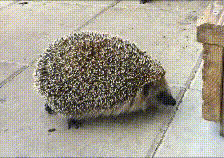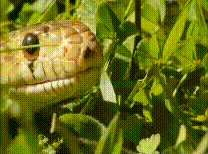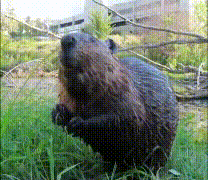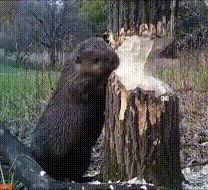BREATHING, SMELLING, AND TASTING
The Five Aggregates.
Some adventurous individuals and awareness groups practice taste or smell awareness is connection with sensory pleasure. And this is a useful first step.
General Awareness
 If i'm not aware of smells, then it's only a limited awareness of the breathing.
If i'm not aware of smells, then it's only a limited awareness of the breathing.
Smell adds colour to the breathing. Smelling turns breathing into a sense rather than just a rhythmic bodily function.
Humans are smelling subliminally all the time, but we hardly notice it. We have effectively lost any awareness of how smell influences our emotions, psychology, and inner-body awareness.
None of our three external senses are as intimate as the sense of smell. We take smell inside our bodies in a way we don't feel with sounds and sights.
Smelling and tasting are intrinsically connected. Snakes, lizards, and many other reptiles, smell with their tongues.
Evolution of Smelling and Tasting
Humans start tasting in the womb. This is evident from the pregnant mother's cravings which can begin as early as the fifth week. In all probability, the foetus is initially more aware of itself as a sense of taste, than as a body shape.
At around 5 months, unborn babies start hearing sounds inside the mothers body, and around 6-7 months they can recognise familiar voices outside. The embryo is normally able to sense light outside, through the mother's body, at the beginning of the 8th month.
The point is – taste is by far the most basic sense. We can taste, long before we can hear and see.
But it is not until birth that we breathe for the first time, and then we start smelling.
We Taste Smells
It feels as though smells turn to tastes when they touch mucous skin receptors inside the body. In effect, we taste smells.
Such mucous surfaces exist throughout the body – and also on the outside of the body. The lips are extremely sensitive to taste.
Some experts maintain that only the tongue can taste, because it alone has taste receptors. I am suggesting that all over and throughout our body there is a sensitivity to smell and taste. And i am suggesting that babies, possibly young children, and animals are conscious of this.
The effects of pure panoramic seeing and listening are obvious, they are manifest, and some parts of how they work are relatively easy to rationalise, explain, and write about.
Tastes and smells involve inner-body awareness, which is a very subjective and mysterious area.
Any individual or group of adults could easily start fooling themselves about how tastes, smells, and inner-body awareness really feels.
I don't want to get involved in theories or anything an innocent animal wouldn't feel. And the only sensible way i can think of, to get clear guidelines about how it really feels, is to try and find a consensus of opinion among small children, before they lose their innocence and get drawn into 'knowing stuff' like where the heart and lungs are.
First Exercises
As we know from reptiles – it's basic to nature – the senses of taste and smell overlap. And in practice, it's enjoyable and effective to explore tasting and smelling at the same time.
Humans are so unfamiliar with their sense of smell and inner-taste that it takes time to develop. Start now.
We need to start with focusing exercises. Even with years of practice, the panoramic use of smelling may only be possible in ideal situations.
Whenever you notice a good smell – coffee, a succulent meal, or at the bakers – take a moment to enjoy it. Notice how the smells seem to fill your whole body.
The actual taste of food is of little importance. But after a drink or meal, notice all the different variations of taste in your mouth and down to your stomach.
The following guidelines will stimulate curiosity and exploration.
Tasting
The taste of our own body from the inside is a vital part of life, yet we hardly notice it.To rediscover the various basic tastes inside your body, notice the contrasts in your mouth. Use the very sensitive tip of your tongue to touch and taste all the areas inside your mouth – under the tongue and above it, at the sides, and the roof and back of the mouth.
The specific taste of any food and drink, while we're eating them, is largely irrelevant. But the bodily sensations afterwards can be very useful to stimulate taste-awareness.
If you drink something and swill it around your mouth, you will notice variations of the flavour all over your mouth. A minute later you will sense it down your central body and in your stomach. A few drops of whisky are especially effective.
After a rich and balanced meal, a sense of the taste of that meal is present all over the body. It depends on what you eat, but it seems to take between 2 and 10 hours for the effects of a meal to vanish.
If you eat soup, salad, meat, pudding, cheese, and wine, the inner tastes cancel each other out, you will feel full, but normally it's going to neutralise the after-taste effect which i believe all other animals enjoy.
Animals usually eat one sort of food at a time. A simple diet is far better to stimulate basic body taste awareness.
This inner-after-taste is a solid sense of the reality of the size and shape of the body from the inside.
Start to think about tasting your basic body as it is, without the overpowering influence of luxurious food. Fasting for 24 hours is a valid experience.
Smelling
It's pointless doing smelling exercises straight after a meal, i.e. when your body is full of tastes. The natural time to smell is before eating or drinking, when bread is baking, a meal or coffee is cooking or being prepared... and you're preparing to taste it. At this stage, we need to use sensory pleasure to interest and motivate us. Over the next few days and weeks, whenever you notice a good smell – cooking meals or coffee, at the bakers, by the supermarket fresh vedge or meat counter (depending on preference) – close your eyes and stay with the smell for a minute, let the smells fill you.
At this stage, we need to use sensory pleasure to interest and motivate us. Over the next few days and weeks, whenever you notice a good smell – cooking meals or coffee, at the bakers, by the supermarket fresh vedge or meat counter (depending on preference) – close your eyes and stay with the smell for a minute, let the smells fill you.
Find Meadowsweet in July. This was my first conscious experience of smelling with and in my whole body. Find flavours which are strong and good to smell: flowers, fruits, or essential oils. Be inquisitive and enjoy them.
Unless a smell is compelling or horrible, it quickly becomes subliminal. Normally we will experience a new smell for maybe 10 seconds before it becomes subliminal. By closing the eyes and maintaining an awareness of the smell – it will remain conscious for longer.
It will soon become necessary to notice the contrast between the 'in-smell' and your own 'out-smell'.
 This is important for a very practical reason: If you concentrate exclusively on incoming scents, you will probably get dizzy. Noticing the contrasting smell of your own out-breath, regulates the speed of your breathing.
This is important for a very practical reason: If you concentrate exclusively on incoming scents, you will probably get dizzy. Noticing the contrasting smell of your own out-breath, regulates the speed of your breathing.
For short periods, you could start to separate the smells, by opening your mouth on the out-breath and 'tasting' your own out-breath. We seem to do this naturally when smelling something healthy and steamy like real coffee.
General Approach to Smells and Tastes
Most of the tasting and smelling exercises can be done for at least 5 minutes at a time. They are focusing exercises, not like the panoramic seeing and listening exercises.
You don't need to practice them every day. This is a strange new world you're entering. It needs a different general approach.
It's the sort of exploration where you may feel like doing it intensively for a week or more, but then you will need a break, to let the sensations and impressions settle down in your subconscious for a while.
Chapter 6 explores the senses of taste and how we ingest and digest smells, inside our body.
Chapter 1 continues with : Warm-up Exercises
Back to Chapter One : The Animal Teachings
Go to Chapter Six : Smelling and Tasting
Back to THE PANORAMA SENSES Priority Pages